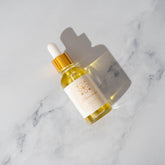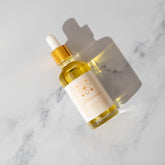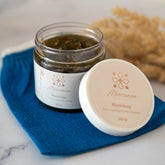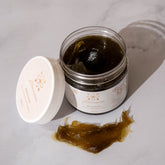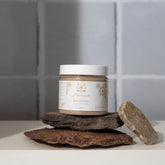Les origines du khôl marocain
Bien avant que l'eyeliner n'envahisse les rayons des magasins de beauté, les femmes du Maroc, d'Égypte et du Moyen-Orient maîtrisaient déjà l'art de maquiller leurs yeux. Le khôl , ou « el kohl el beldi » au Maroc, est utilisé depuis des millénaires. Des archéologues ont retrouvé des traces de pigments similaires dans d'anciennes tombes, témoignant de son importance dans la vie quotidienne et la spiritualité.
Dans la culture marocaine, le khôl n'a jamais été qu'un simple produit cosmétique. C'était un rituel de pureté, de protection et d'affirmation identitaire . Appliqué avant les mariages, les fêtes ou les prières, il était censé protéger les yeux de l'éblouissement, de la poussière et du mauvais œil , tout en symbolisant la force intérieure et la beauté féminine.
Des minéraux aux plantes : l'évolution d'une tradition
Historiquement, le khôl était fabriqué à partir de minéraux comme la galène, une source naturelle de plomb. Cependant, la prise de conscience actuelle concernant les métaux lourds a orienté l'attention vers des alternatives végétales . Chez Moroccanism, nous avons intégré cette évolution en proposant une formule entièrement exempte de métaux et de produits chimiques , fidèle à la tradition tout en garantissant sécurité et pureté.
Notre khôl marocain pur est élaboré à partir de poudres végétales naturelles, comme les clous de girofle et les noyaux d'olive , soigneusement torréfiées et broyées pour obtenir un pigment ultra-fin, semblable à de la suie. Ce procédé permet d'obtenir un noir profond et intense, légèrement brillant, d'apparence identique au khôl traditionnel, mais entièrement naturel et sans danger pour un usage quotidien.
Les clous de girofle apportent un arôme délicat et de légères propriétés antibactériennes, tandis que les noyaux d'olive confèrent à ce mélange sa couleur noire intense, emblématique de la beauté marocaine depuis des siècles. Broyé avec une précision extrême, il est ensuite conditionné dans des boîtes en bois fabriquées artisanalement , préservant ainsi sa fraîcheur et son authenticité.
Un symbole de grâce, de protection et d'identité
Au Maroc, l'application du khôl revêtait souvent une signification spirituelle. On lui attribuait le pouvoir de protéger la vue et de préserver des énergies négatives , surtout lorsqu'il était préparé à partir de matières pures et bénites. Lors d'occasions spéciales, les mères traçaient délicatement un trait de khôl sur les yeux de leurs filles, un geste d'amour et de continuité entre les générations.
L' applicateur de khôl en bois , appelé merwed , était trempé dans la poudre et tapoté légèrement pour enlever l'excédent de pigment avant d'être appliqué sur la paupière interne. Le résultat était non seulement captivant, mais aussi apaisant pour les yeux, particulièrement sous les climats désertiques.
Pourquoi choisir le khôl pur marocain aujourd'hui ?
Les eye-liners modernes contiennent souvent des cires synthétiques, des stabilisateurs et des colorants. Le Pure Kohl de Moroccanism offre une alternative naturelle et respectueuse de la peau pour celles et ceux qui recherchent l'élégance sans compromis.
-
100% naturel et végétal - à base de clous de girofle et de noyaux d'olive
-
Sans métaux lourds, parabènes ni colorants artificiels.
-
Doux pour les yeux sensibles
-
Fabriqué artisanalement au Maroc en petites quantités
-
Polyvalent : utilisez-le comme eyeliner, fard à paupières léger ou estompez-le pour un effet charbonneux.
Chaque coffret de khôl en bois incarne la simplicité et l'intégrité de l'artisanat marocain — un morceau de patrimoine vivant que vous pouvez tenir entre vos mains.
Comment utiliser le khôl marocain
-
Préparation de l'applicateur : Trempez légèrement le bâtonnet en bois ( merwed ) dans le pot de khôl.
-
Tapotez pour enlever l'excédent de poudre et éviter les retombées.
-
Appliquez délicatement le long de la muqueuse ou de la ligne des cils ; un seul passage suffit pour créer un look défini et élégant.
-
Pour un fini plus doux , estompez légèrement avec un pinceau ou du bout des doigts.
-
Nettoyez régulièrement l'applicateur avec un savon doux et séchez-le avant la prochaine utilisation.
Le khôl peut se porter seul pour un look classique ou associé à du mascara pour un regard plus moderne. Son fini mat naturel flatte toutes les carnations et toutes les couleurs d'yeux, pour une élégance intemporelle.
Un héritage de beauté marocaine
Le Pure Kohl de Moroccanism est bien plus qu'un simple produit cosmétique : c'est un pont entre sagesse ancestrale et minimalisme contemporain . Chaque pot capture l'essence de l'artisanat marocain : pureté, rituel et la force tranquille de la simplicité.
Lorsque vous ouvrez votre coffret en bois fabriqué à la main, vous ne révélez pas seulement des pigments, vous dévoilez une histoire écrite par des générations de femmes qui croyaient que la beauté devait être à la fois sacrée et naturelle.
Découvrez l'héritage
Redécouvrez l'élégance marocaine avec Pure Moroccan Kohl - Coffret en bois artisanal , disponible dès maintenant sur Moroccanism.ca .
Propre. Authentique. Intemporel.


